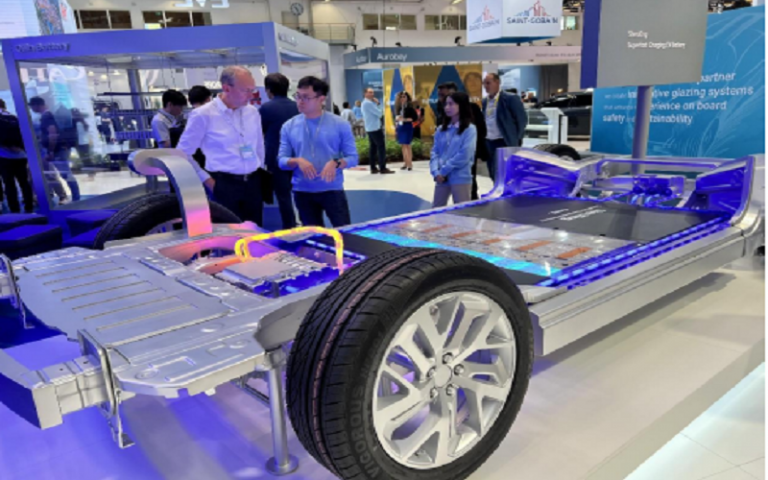
By Li Qiang, In recent years, Chinese smart manufacturing products, represented by artificial intelligence (AI), cloud computing, drones, smart home appliances, and new energy vehicles (NEVs), have become popular in Europe, bringing new experiences to European consumers and contributing to Europe’s green and low-carbon transformation.
At the opening ceremony of the Paris 2024 Olympics Games, 1,100 Chinese-made drones accurately formed the Olympic rings, the emblem, and the image of a torchbearer symbolizing hope and dreams. The perfect integration of technology and nature was achieved through the interplay of light and shadow. This drone formation, provided by Chinese company HighGreat, was unquestionably a surprise.
An executive of the company said that the drones used in the performance were equipped with an upgraded mounting system that allowed them to carry different attachments such as fireworks and party sprays. This mirrored the company’s technological innovation capability in product development.
Chinese technology also contributed to the innovation in Olympic broadcasting methods. At the Paris Olympics, cloud computing surpassed satellites for the first time as the main distribution method for live signals, with over two-thirds of the signals being distributed globally via Alibaba Cloud, the cloud computing arm of Alibaba, a Chinese e-commerce giant.
It is reported that the Paris Olympics produced over 11,000 hours of ultra-high-definition content, an increase of more than 15 percent compared to the Tokyo Olympics, while the size of the Olympic broadcasting center decreased by nearly 23 percent.
“This was largely due to the extensive use of Alibaba Cloud during the Games,” said Sotiris Salamouris, chief technology officer of Olympic Broadcasting Services.
Hisense Group, a Chinese multinational major appliance and electronics manufacturer, was named the official screen provider for Video-Assisted Referee (VAR) of the UEFA EURO 2024 held in July, helping referees make more accurate judgments.
It marked the first time for UEFA to grant a sponsor exclusive right to provide the official screens for VAR, which indicated the recognition received by Chinese display technologies.
Chinese NEV manufacturer BYD also became an official partner of the event, providing green and low-carbon travel services.
Paul Tai, regional director of the Far East & Global Head of MainettiCare, a leading global retail solutions provider based in Italy, said that Chinese brands are competitive, and with the increasing application of AI and automation technology, Chinese smart manufacturing will continue to move toward the high end of the global industrial and value chains.
In recent years, Chinese companies have increased their investment in technological innovation and R&D, continuously launching new technologies, products, and solutions. As a result, the recognition of Chinese brands by European consumers has been steadily improving.
To meet the demand of French consumers for high-tech products, Hisense France has set up a product development team composed of local personnel and headquarters staff.
Liu Tao, general manager of Hisense France, said that 92 percent of the components of Hisense laser TVs can be recycled, and their energy consumption is only one-third of regular LCD TVs. Chinese smart manufacturing well aligns with the consumer demand for intelligence and sustainability in the European market.
China emerged as the top exhibitor group for the first time at the Smarter E Europe 2024 held this June in Munich, Germany, with nearly 1,000 Chinese companies participating in the event.
A report released by SolarPower Europe during the exhibition noted that China’s vibrant new energy market has injected strong impetus into the global photovoltaic industry. The global photovoltaic power generation has achieved record growth, largely driven by China, the report added.
China has grown into the world’s largest manufacturer of new energy equipment and a major user of new energy. Chinese companies and their European counterparts continue to expand their cooperation in photovoltaic products and NEVs. They work together to develop competitive and high-quality products and technologies, contributing to energy structure improvement and low-carbon development in Europe.
In the Francisco Pizarro solar power plant in Extremadura, Spain, 1.5 million solar panels are neatly arranged, providing clean energy to 334,000 households. In May this year, Chinese new energy company Rich PV announced to build a solar panel factory with an annual capacity of 1 GW and a 200 MW solar power plant in Paracin, Serbia. Once completed, this power plant will become the largest solar farm in Serbia, contributing to local clean energy transition.
In early 2023, Chinese power battery manufacturer CATL inaugurated its first European battery factory in Thuringia, Germany. The factory is expected to produce 30 million battery cells annually at full capacity, which can be used in the assembly of 185,000 to 350,000 electric vehicles. The factory supplies European car manufacturers such as BMW, Daimler, and Bosch, and provides approximately 2,000 jobs for local communities.
Thierry Laurent, chairman of the Climate Change Working Group, French Foreign Trade Advisors China Committee, said that China’s achievements in the green industry have benefited the world, and China has made significant contributions to global green development.










